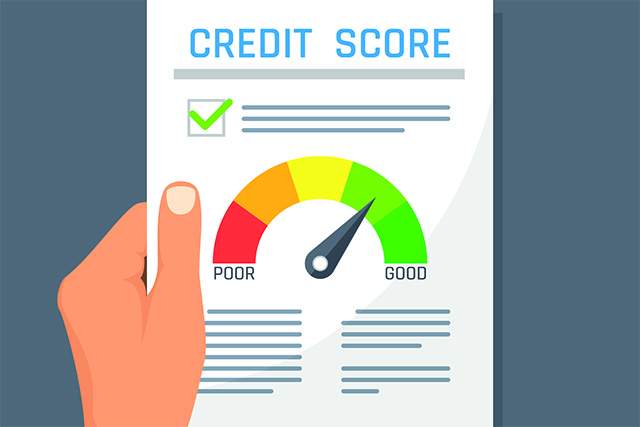Few numbers play such a significant role in your life as your credit score. Just about every major milestone in your life – attending college, buying a car, purchasing a house – is affected by this three-digit number. Therefore, knowing how to start building up credit and maintaining a good credit score important.
If you’re recovering from a poor financial stretch or simply just beginning your credit history, no need to worry, there are still a number of ways to build your credit score. Negative marks on your credit report will diminish over time so the sooner you put these strategies into place, the sooner your credit score will improve.
What Is a Credit Score?
A credit score is an appraisal of a consumer’s creditworthiness. Essentially, it tells financial institutions how likely a consumer is to pay their bills and repay their debts. The vast majority of lenders use Fair Isaac Corporation or FICO credit scores, which are determined by five factors: payment history (35%), credit usage (30%), age of credit accounts (15%), credit mix (10%) and new credit inquiries (10%).
FICO credit scores range from 300-850 and are categorized as excellent (800 to 850), very good (740 to 799), good (670 to 739), fair (580 to 669) and poor (300 to 579).
How to Start Building Your Credit
If you are just starting out, the first steps to establishing good credit include opening a bank account to prove you are good at saving, and of course getting a credit card that you will use – and pay back – frequently.
You may want to consider a rewards card like the AAA Visa Signature®credit card, which provides added incentives like cash back on everyday purchases, such as groceries and gas. If you are a frequent traveler, the AAA Travel Advantage card helps you earn more when you use your card to pay for expenses related to travel, dining and car rentals. Learn more.
If you have a friend or family member with a long track record of responsible credit card use, ask them if you can join one of their accounts as an authorized user. It’s a quick and easy way to build your credit score. An authorized credit card user is a secondary account holder who can, at the primary holder’s discretion, use the account to make purchases but is not responsible for making payments.
When you become an authorized user, a new account gets added to your credit report and the positive attributes of said account will boost your credit score. This strategy is particularly useful to help you start building your credit.
Pay Your Bills on Time
This may sound obvious but it cannot be overstated. Payment history makes up more than one-third of your credit score. You cannot build your credit score with a poor payment track record.
There are a few ways to improve your payment history. First, create an organized filing system, set due date alerts or automate payments to ensure bills don’t simply fall through the cracks.
If you miss a payment by 30 days, call your creditor immediately and arrange to submit payment. Some companies may even agree to stop reporting the late payment. If the creditor doesn’t, do what you can to get balanced on your account as soon as possible. Each delinquent month damages your score.
Keep Your Accounts Open
It might seem logical to close out any old credit accounts, but even if you’re not using them anymore, experts suggest keeping them open. This helps build your credit score in two ways. First, it increases the average age of accounts. The older the age, the higher the credit score.
Second, it helps lower your credit utilization, which is the percentage of your available credit that you use and is an important figure in determining your credit score. For example, let’s say you have two credit cards, each with a $10,000 limit. One card you put $5,000 on each month, the other you don’t use. With both accounts open, your credit utilization is 25%, but close your unused card and the figure jumps to 50%.
Limit Hard Inquiries
Does checking your credit score lower it? Soft inquiries, such as checking your own credit score or allowing potential employers to check your credit, will not affect it. However, financial institutions perform what’s known as a hard inquiry into your credit history whenever you apply for a credit card, mortgage or loan. These types of inquiries affect your credit score.
The occasional hard inquiry is not a problem, but many of them in a limited amount of time can hurt your credit score. Companies could view this as you needing to continually take out money in order to pay your bills. Furthermore, opening new accounts will decrease the average age of your accounts, another factor in determining your credit score. It’s best to only apply for new financing when you truly need it.
One caveat to the hard inquiry rule is searching for the best loan rates. Credit scoring models can recognize when consumers are shopping around and often ignore hard inquiries if they all occur in a short period of time. Yet another great reason to explore the low interest rates offered by AAA on auto, home and student loans.

Dispute Errors
Equifax, Experian and TransUnion are the three major national credit bureaus in the U.S. Consumers are granted one free copy of their credit report from each bureau each year.
It’s possible for mistakes to be made on your credit report. Request a copy of your report by visiting AnnualCreditReport.com. Once you receive it, check to make sure all the information is correct. Some things to look for are payments being marked as late when they were made on time or negative information from years ago that should have been removed. (Most negative credit marks stay on your report for seven years.)
If you do catch an error, gather all the relevant documents and evidence that prove the mistake wrong and dispute it to the credit bureaus immediately. You can usually do so online, on the phone or by writing a letter. The bureau must investigate and respond within 30 days. It’s also a good idea to inform the company that provided the information of the mistake.
Whether it’s securing a loan, purchasing a car or saving for retirement, AAA is here to help you with all your financial needs. Learn more about all the products and services available to members.

















